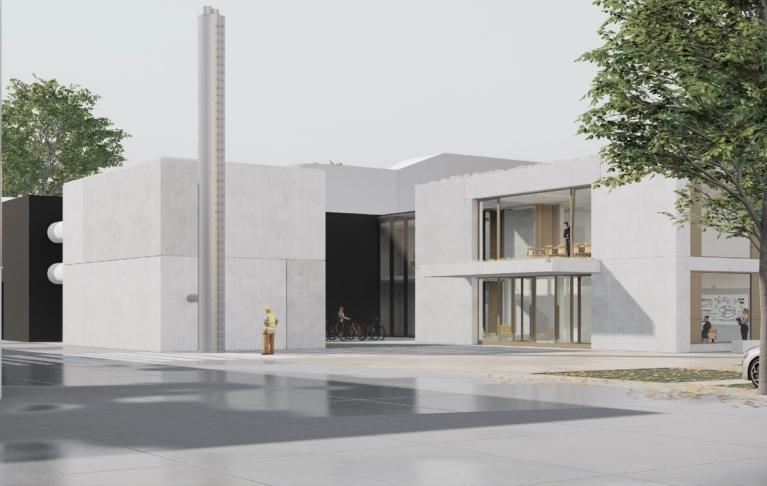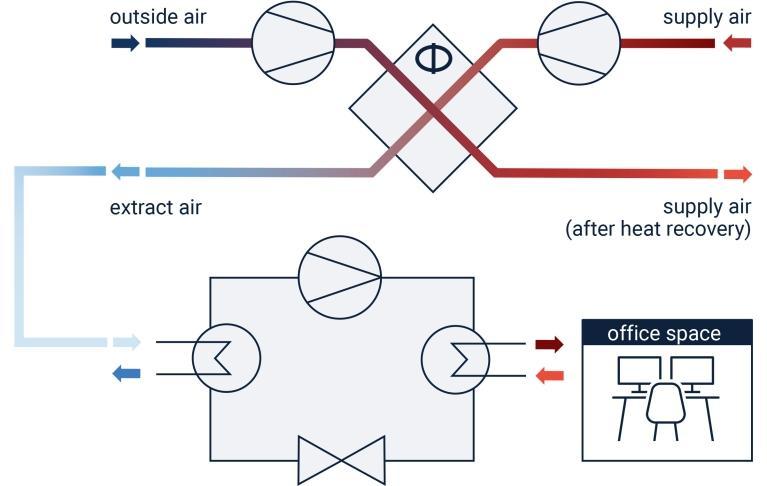Energy Supply Company Küper, Bochum
Sustainable energy and waste heat utilization concept for the future of manufacturing
The Innovation branch of ZWP Ingenieur-AG (now MorgenGrün) has developed a sustainable energy concept for the Küper production campus in Bochum that packs a punch: more efficiency, fewer emissions, full cost-effectiveness. Thanks to photovoltaic systems, smart heat pump technology and the decision in favour of 100 percent electrification, the entire campus can be operated in a CO2-neutral manner - and it will pay for itself for another 30 years. A best-practice example of sustainable industrial processes with foresight.
Energy-intensive, but efficient: the challenge
Küper, an international manufacturer of snow ploughs and screening systems, has been in business for over 60 years and supplies 30 countries worldwide. High process heat temperature levels are required for manufacturing at the production site in Bochum, which makes sophisticated energy system planning indispensable. As early as 2010, the ZWP branch in Bochum and the innovation department of ZWP Ingenieur-AG (now MorgenGrün) were commissioned to develop an energy concept for the new production and administration site and the subsequent technical building services planning for the building on Josef-Baumann-Straße (JBS). The site went into operation in 2012 - with initial measures for greater energy efficiency.
Tougher initial conditions
In 2019, the next big step for Küper was on the agenda: a second Bochum site was to be merged with the JBS production site. The expansion included the construction of a second hall and an office building, which were integrated into the comprehensive energy planning.
One thing was clear: an integrative energy concept was needed for the new production campus (see illustration) that would fulfil both ecological and economic requirements. The ZWP innovation department (now MorgenGrün) was commissioned again. This time, the task was to examine various supply options.
However, the framework conditions changed drastically during the planning phase: energy prices skyrocketed, climate targets were tightened and new technologies came into focus. So the 2023 concept was revised - with innovative solutions for a low-emission future.
Analysis, optimisation, innovation
Before the concept was developed, a detailed analysis of the current situation and requirements was carried out. The aim was to minimise the energy consumption of the new campus and find a solution that was not only sustainable but also economically viable. A PV system at the site has been supplying parts of the company with solar power since 2012. In addition, the waste heat from the production processes was partially utilised by a heat recovery system (RLT). The challenge: What other measures can we take to reduce emissions while ensuring economical, reliable production?
Developing the best solution: electrification and renewable energies
Four variants for the energy supply of the entire site were developed on the basis of the existing situation and requirements analysis. A central element of this was the integration of a new PV system on the roof of the new hall building and the use of an exhaust air waste heat pump for space heating and drinking water. Electric and biomass boilers were compared as alternatives for high-temperature processes and peak loads for space heating.
Winner in the eco-eco-duel: exhaust air heat pump plus XXL-PV beats biomass
The analysis was clear: the ‘100 % electrification’ variant showed the best economic results when all investment, operating, energy and CO2 costs over a period of 30 years were taken into account. The variant with an exhaust air waste heat pump, large PV system and electric boilers proved to be more economical and ecological compared to the biomass solution.
This means:
- Photovoltaics on existing and new buildings for maximum own electricity utilisation,
- heat pumps for heating and process heat, fed from renewable electricity and waste heat from production,
- intelligent control to optimise the use of energy.
The result:
Compared to the existing operation, the cumulative CO2 emissions were reduced by 50%, which emphasises the importance of this project in terms of sustainability and resource conservation. With the use of green electricity, completely emission-free operation is even possible in the long term.
Sustainability as a model for success
With the new energy concept, Küper- proves that industrial production and climate protection need not be a contradiction in terms. The new campus will not only be more sustainable, but also more economically robust. The switch to renewable energies and electrification ensures lower operating costs and long-term security of supply.
MorgenGrün has developed a smart, future-proof concept that shows: climate-friendly industry is feasible - and it pays off.
Overview
Client
Küper GmbH & Co. KG, Bochum
Time frame
MorgenGrün: 2010, 2019 and 2023
ZWP: 2010-2011
Services
Morgengrün: Study on the energy supply of an expanded production campus
ZWP: Planning and Site Supervision (Phases 1 to 8 HOAI) for new building hall 1
Saved CO2 Emissions
40 kg/m2a

